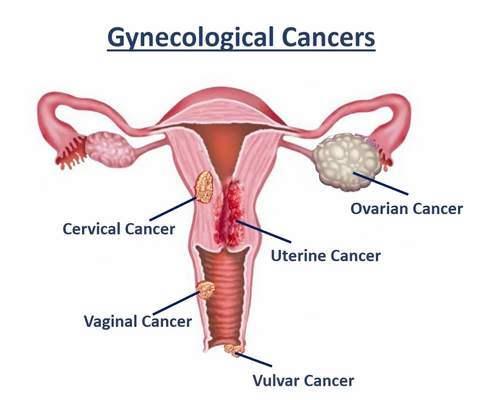GET CARE
Understanding Gynecological Malignancies: Types, Symptoms, and Prevention Introduction:

Gynecological malignancies, or cancers that affect the female reproductive system, are a significant health concern for women worldwide. These cancers can manifest in various organs, including the ovaries, uterus, cervix, vagina, and vulva. Understanding the types, symptoms, and preventive measures is crucial for early detection and effective management. In this blog post, we will delve into the common gynecological malignancies, their symptoms, risk factors, and preventive strategies.
Types of Gynecological Malignancies:
Ovarian Cancer: Ovarian cancer is often called the “silent killer” because symptoms can be subtle in the early stages. Common symptoms include abdominal bloating, pelvic pain, changes in bowel habits, and a feeling of fullness. Early detection is challenging, making regular gynecological check-ups and awareness vital for prompt intervention.
Uterine Cancer: Uterine cancer primarily affects the lining of the uterus. Postmenopausal bleeding, pelvic pain, and abnormal vaginal discharge are common symptoms. Regular pelvic exams and awareness of unusual changes can aid in early detection.
Cervical Cancer: The human papillomavirus (HPV) is a significant risk factor for cervical cancer. Regular Pap smears and HPV vaccinations can help in early detection and prevention. Symptoms may include abnormal bleeding, pelvic pain, and pain during intercourse.
Vaginal Cancer: Vaginal cancer is a rare form of gynecological malignancy. Symptoms may include abnormal vaginal bleeding, pelvic pain, and a lump or mass in the vagina. Early detection is challenging, making awareness crucial for seeking medical attention promptly.
Vulvar Cancer: Vulvar cancer affects the external genital organs. Symptoms may include itching, pain, and changes in skin color. Regular self-examinations and seeking medical advice for persistent symptoms are essential for early detection.
Risk Factors for Gynecological Malignancies:
- Age: The risk of gynecological cancers increases with age.
- Family History: A family history of certain cancers may increase the risk.
- Genetics: Inherited gene mutations, such as BRCA1 and BRCA2, are linked to ovarian and breast cancers.
- HPV Infection: Persistent HPV infections can lead to cervical cancer.
- Hormonal Factors: Hormonal imbalances, such as estrogen dominance, can contribute to uterine and ovarian cancers.
Preventive Strategies:
Regular Screenings: Routine gynecological exams, Pap smears, and HPV vaccinations can aid in early detection and prevention.
Healthy Lifestyle: Maintaining a healthy lifestyle with a balanced diet, regular exercise, and avoiding smoking can reduce the risk of gynecological cancers.
Genetic Counseling: Women with a family history of gynecological cancers may benefit from genetic counseling to assess their risk and take preventive measures.
Awareness and Education: Educating oneself about the symptoms and risk factors of gynecological cancers empowers women to seek medical attention promptly.

